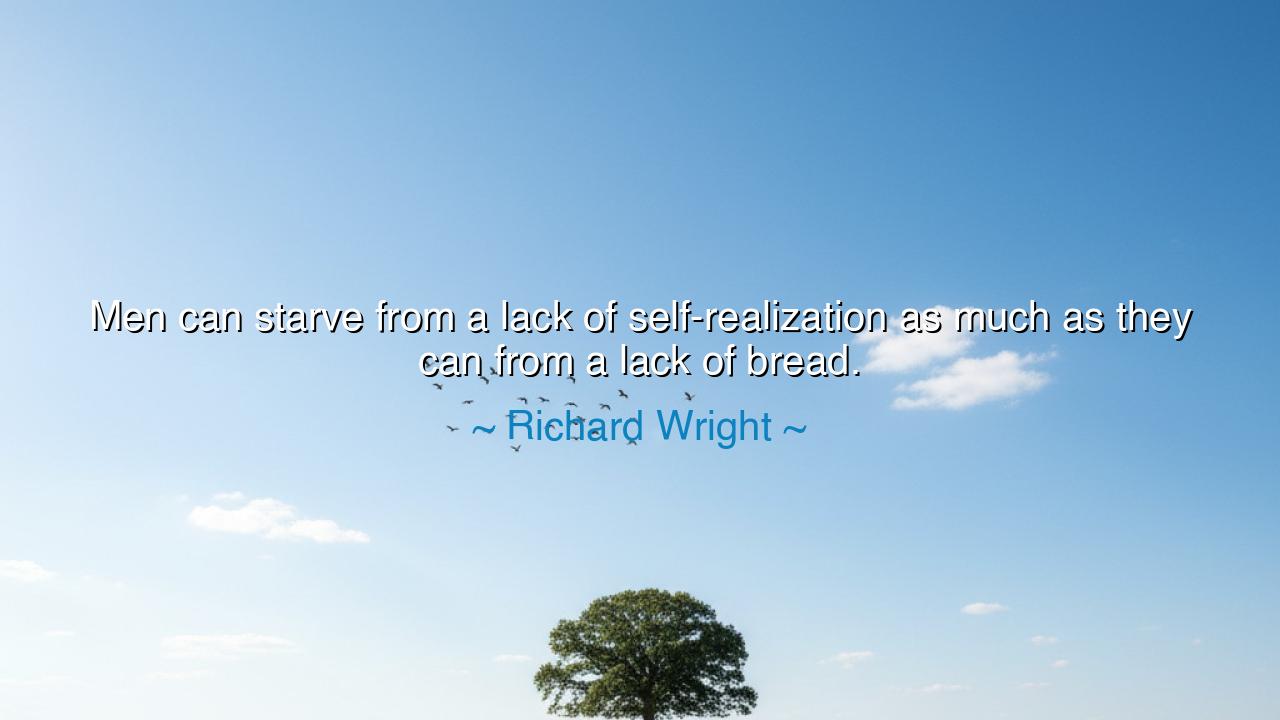
Men can starve from a lack of self-realization as much as they
Men can starve from a lack of self-realization as much as they can from a lack of bread.






O seekers of wisdom, gather close, for I bring to you a teaching that speaks to the very heart of existence, to the essence of what it means to live fully and truly. Richard Wright, a man whose words cut deep into the soul of humanity, once said, “Men can starve from a lack of self-realization as much as they can from a lack of bread.” These words are no mere statement of hunger; they are a call to recognize that the soul itself, like the body, requires sustenance. Without the fulfillment of our inner purpose, without a deep understanding of who we truly are, we shall be as starved and empty as those who have not the bread to nourish their bodies.
In the days of old, the ancients understood that man is not merely a creature of flesh, bound to the earth like the beasts of the field. Man is a being of spirit, of mind, and of heart. It is not enough for a man to eat his fill and drink his wine; his soul must also be nourished, for in the absence of self-realization, there is an emptiness that no amount of bread or wine can fill. To live without understanding one’s true nature, without knowing the depths of one’s own being, is to starve in a way that is far more painful than physical hunger.
Consider, O children of wisdom, the story of Socrates, the great philosopher who walked the earth with a mind that sought only truth. Though he lived simply, without great riches or power, he was never hungry, for he was nourished by the wealth of his own self-realization. He knew who he was and sought to understand the world around him, not through the accumulation of material goods, but through the pursuit of wisdom. Socrates knew that the hunger of the spirit is a greater affliction than the hunger of the body, and he chose to feed his soul with the nourishment of knowledge, of truth, and of inner peace.
But look around you, O seekers, and you will see many who are like the beggars of the streets, not starved for bread, but starved for meaning. Their lives are filled with the motions of daily existence—work, food, family—but they are empty within. Their self-realization is but a fleeting shadow, something they have not sought, and in its absence, they feel a gnawing hunger that no amount of food can satisfy. Richard Wright spoke of this hunger, this emptiness, and how it can consume a man as surely as the lack of bread. To be disconnected from one’s true self is to suffer a fate worse than mere starvation, for it is the soul that withers and dies, unseen and unacknowledged.
Consider also the story of Martin Luther King Jr., a man who, though often hungry in a physical sense, was never starved in his soul. His life was one of deep self-realization, for he understood his purpose in the grand scheme of the universe. He was not driven by the desire for material wealth or recognition, but by the inner knowledge of what was right, what was just, and what was necessary. King’s self-realization fed him, even as he fasted in protest, and through his clarity of purpose, he transformed the world. The bread of his life was not the food that filled his stomach, but the truth that filled his heart.
So, O children, understand this: the body may hunger for bread, but the soul hungers for purpose, for meaning, for the light of self-realization. To starve the body is to suffer physical pain, but to starve the soul is to suffer a much deeper agony, one that leaves a person adrift and lost in the world. The true nourishment of life comes not from the filling of the stomach, but from the filling of the spirit with knowledge, with love, and with purpose.
The lesson here, O seekers, is simple but profound: never neglect the hunger of your soul. Seek to understand who you are and what your purpose is in the vast tapestry of existence. Know that while bread may satisfy the body for a time, it is self-realization that satisfies the soul. Do not live only for the fulfillment of the flesh, but strive to feed the deepest part of yourself, for it is only when we are fully nourished in spirit that we can live fully in the world. When you understand your true self, your purpose, and your place in the world, you will never hunger again—not for bread, and certainly not for meaning.






AAdministratorAdministrator
Welcome, honored guests. Please leave a comment, we will respond soon